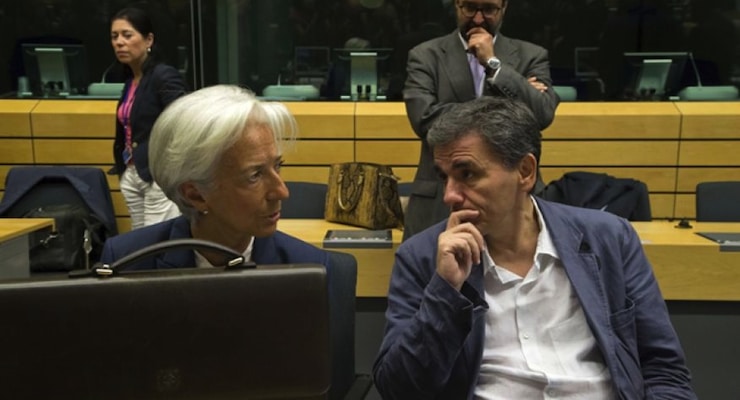

July 12, 2015: Greek Finance Minister Euclid Tsakalotos, right, speaks with Managing Director of the International Monetary Fund Christine Lagarde during a round table meeting of eurogroup finance ministers at the EU Lex building in Brussels. (Photo: AP/Michel Euler)
Greece and its European creditors hatched out a new bailout agreement early Monday that European Council President Donald Tusk said imposes “serious reforms.” The deal temporarily averts the prospect of a Grexit, or the government of Athens exiting from the euro zone and breaking from the single currency.
European Council President Donald Tusk tweeted shortly before 9 a.m. local time Monday that the so-called EuroSummit had “unanimously reached agreement” on a financial aid program that included what Tusk called “serious reforms” and “financial support” for the leftwing Athens government. At a news conference later Monday, Tusk jokingly referred to the deal as an “a-Greek-ment.”
Yet, despite Greece’s socialist leaders bringing the nation to the financial brink in the hope to secure a deal that lessens pain from debt and entitlement cutbacks, they agreed to cut back even further in exchange for more loans. Without the EU funding, the country’s financial system will collapse, but the deal still requires approval from Greece’s parliament by the end of Wednesday.
“We managed to avoid the most extreme measures,” Greek Prime Minister Alexis Tsipras said. “Greece will fight to return to growth and to reclaim its lost sovereignty.”
Greek debt is currently at around 320 billion euros ($357 billion), which represents roughly 180 percent of the country’s annual gross domestic product. Few economists think that debt will ever be fully repaid. Last week, the International Monetary Fund said Greece’s debt will need to be restructured.







